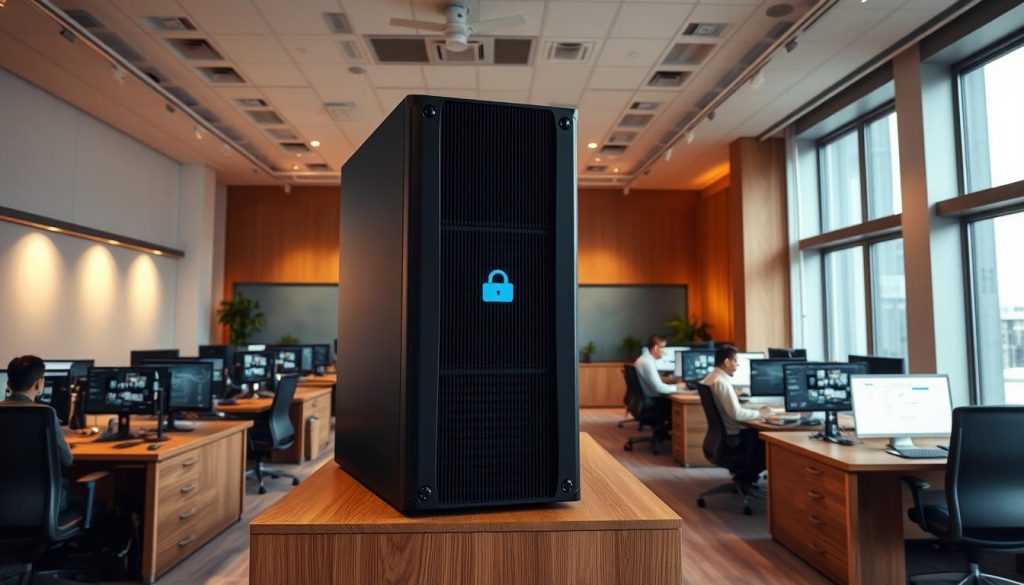In today’s digital landscape, protecting online communications is paramount for businesses and individuals alike. As cyber threats evolve, the need for a reliable and secure email solution has become increasingly important.
We empower your business with our webmail secure server, designed to safeguard your online inbox and ensure the privacy of your critical communications. By utilizing a secure email server, you can significantly reduce the risk of data breaches and cyber attacks.

With our expertise and proactive protection, you can trust that your online communications are safe and protected.
Key Takeaways
- Enhanced security for online communications
- Protection against data breaches and cyber attacks
- Reliable and secure email solution
- Proactive protection for businesses
- Expertise in cybersecurity solutions
The Growing Importance of Email Security in Business
As cyber threats escalate, the importance of robust email security in business environments cannot be overstated. Cybercrime isn’t a looming threat—it’s here, happening every day, and your inbox is one of the most common targets. Whether you’re a business owner, IT lead, or just trying to protect your personal data, email security is your first line of defense.
Current Email Security Landscape
The current email security landscape is fraught with various threats, including phishing and ransomware attacks. These threats are becoming increasingly sophisticated, making it challenging for businesses to defend against them. Email security threats are evolving, with attackers using more targeted and convincing tactics to breach email systems.
To combat these threats, businesses must adopt email security best practices, such as implementing robust encryption, multi-factor authentication, and regular security audits.
The Cost of Email Security Breaches
The financial and reputational costs associated with email security breaches can be devastating. A single breach can lead to significant financial losses, damage to brand reputation, and loss of customer trust. According to recent studies, the average cost of a data breach is on the rise, emphasizing the need for proactive email security measures.
By investing in robust email security solutions, businesses can mitigate the risk of breaches and protect their communications. This not only safeguards their operations but also helps in maintaining customer trust and complying with regulatory requirements.
What Is a Webmail Secure Server?
A Webmail Secure Server is a robust solution designed to safeguard email communications through advanced security measures. It’s not a single product but a multi-layered architectural approach that systematically addresses the weaknesses of standard email systems.
We recognize that email security is a critical concern for businesses, and a Webmail Secure Server is central to protecting sensitive information. The protection starts with end-to-end encryption, ensuring that emails are accessible only to the sender and the intended recipient.
Technical Architecture and Components
The technical architecture of a Webmail Secure Server involves several key components that work together to provide comprehensive security. These include:
- Encryption Protocols: Implementing protocols like S/MIME and PGP to ensure emails are encrypted.
- Secure Authentication Mechanisms: Utilizing multi-factor authentication to prevent unauthorized access.
- Advanced Threat Detection: Employing AI and machine learning to detect and prevent sophisticated threats.
How Secure Email Servers Protect Your Communications
Secure email servers protect your communications by employing a range of security measures. Email encryption is a critical component, ensuring that emails are encrypted both in transit and at rest. This means that even if emails are intercepted, they cannot be read without the decryption key.
Some of the key ways secure email servers protect communications include:
- Encrypting emails to prevent interception and eavesdropping.
- Implementing robust authentication mechanisms to ensure only authorized users can access emails.
- Using advanced threat detection systems to identify and mitigate potential threats.
Common Threats Targeting Business Email Systems
The security of business email systems is under constant threat from various malicious activities. As we continue to rely heavily on email for business communications, the risk of falling victim to these threats increases. Understanding these threats is crucial for implementing effective security measures.
Phishing and Social Engineering Tactics
Phishing scams have become increasingly sophisticated, making them difficult to detect. Attackers often impersonate trusted organizations to trick victims into clicking on malicious links or divulging personal information. To combat this, businesses must educate their employees on how to identify and report suspicious emails.
- Be cautious with emails that ask for sensitive information.
- Verify the authenticity of emails before responding or clicking on links.
- Use anti-phishing software to detect and block phishing attempts.
Man-in-the-Middle and Interception Attacks
Man-in-the-middle (MitM) attacks involve intercepting communication between two parties, often to steal sensitive information. These attacks can occur when using public Wi-Fi networks or through malware infections. To protect against MitM attacks, businesses should implement encryption for email communications and use secure networks.
Key protection measures include:
- Using encrypted connections (HTTPS, S/MIME, or PGP) for email.
- Avoiding public Wi-Fi for sensitive email activities.
Malware, Ransomware, and Data Exfiltration
Malware and ransomware attacks can compromise email systems, leading to data breaches or financial loss. Data exfiltration occurs when attackers extract sensitive data from a compromised system. Businesses must implement robust security measures, including antivirus software, regular updates, and employee training to prevent these types of attacks.
By understanding these common threats and implementing appropriate security measures, businesses can significantly reduce the risk to their email systems. Regular security audits and employee education are key components of a robust email security strategy.
Essential Features of Webmail Secure Server Systems
The security of email communications is paramount, and webmail secure servers are equipped with essential features to ensure this. These features are designed to protect against various threats and maintain the integrity and confidentiality of email communications.
Encryption Protocols: S/MIME and PGP
Email encryption is a critical component of webmail secure servers. Protocols such as S/MIME and PGP ensure that emails are encrypted both in transit and at rest. For instance, Proton Mail has integrated OpenPGP encryption, automatically encrypting emails between Proton Mail accounts and allowing easy encryption to non-Proton Mail addresses with an OpenPGP key.
Multi-Factor Authentication Implementation
Multi-factor authentication (MFA) adds an additional layer of security to email accounts. By requiring users to provide two or more verification factors, MFA significantly reduces the risk of unauthorized access. Implementing MFA is considered an email security best practice, as it makes it much harder for attackers to gain access to email accounts.
Advanced Threat Detection and Prevention
Webmail secure servers employ advanced threat detection and prevention mechanisms to identify and block sophisticated threats such as phishing attacks, malware, and ransomware. These mechanisms often involve AI and machine learning algorithms to stay ahead of emerging threats.
SSL/TLS Implementation and Certificate Management
The implementation of SSL/TLS protocols ensures that emails are encrypted during transit, protecting against interception. Proper certificate management is crucial for maintaining the integrity of this encryption. Regular updates and monitoring of SSL/TLS certificates prevent vulnerabilities that could be exploited by attackers.
By incorporating these essential features, webmail secure server systems provide robust protection for email communications. Organizations should prioritize these features when selecting a webmail secure server solution to ensure the security and integrity of their email communications.
Implementing a Webmail Secure Server for Your Business
Implementing a webmail secure server is a critical step in safeguarding your business communications. As cyber threats continue to evolve, it’s essential to take a proactive approach to email security.
Security Requirements Assessment and Planning
Before implementing a webmail secure server, it’s crucial to assess your organization’s security requirements. This involves identifying potential vulnerabilities, understanding compliance regulations, and determining the level of security needed. Key considerations include data encryption, access controls, and threat detection capabilities.
- Conduct a thorough risk assessment to identify potential security threats
- Determine the types of data being transmitted and stored
- Establish clear security policies and procedures
Deployment Options: Self-Hosted vs. Cloud Solutions
When implementing a webmail secure server, businesses must decide between self-hosted and cloud-based solutions. Self-hosted solutions offer greater control over security infrastructure, while cloud-based solutions provide scalability and reduced maintenance costs. We recommend evaluating your organization’s specific needs and resources before making a decision.
Integration with Existing Security Infrastructure
To maximize the effectiveness of your webmail secure server, it’s essential to integrate it with your existing security infrastructure. This includes integrating with firewalls, intrusion detection systems, and antivirus software. Seamless integration ensures comprehensive protection against various threats.
Employee Training and Security Awareness Programs
Even with a robust webmail secure server in place, human error can still pose a significant risk. Regular employee training and security awareness programs are vital in educating staff about email security best practices, such as identifying phishing scams and avoiding suspicious attachments. Educate yourself on phishing scams by understanding how phishing works and watching for telltale signs like generic greetings, misspelled words, or suspicious email addresses.
By following these guidelines and implementing a webmail secure server, businesses can significantly enhance their email security posture and protect against emerging threats.
Business Benefits of Investing in Secure Email Infrastructure
The importance of a secure email infrastructure cannot be overstated, as it directly impacts a company’s ability to protect sensitive data and maintain customer trust. By investing in a robust secure email server, businesses can reap numerous benefits that contribute to their overall success and resilience.
Regulatory Compliance and Data Protection
Regulations like GDPR and HIPAA impose strict data protection requirements on businesses. Non-compliance can lead to massive fines and litigation, damaging a company’s reputation and bottom line. A secure email solution with policy-based encryption and audit trails is essential for meeting these compliance requirements. By implementing such a solution, businesses can ensure the confidentiality and integrity of sensitive information, thereby avoiding potential legal and financial consequences.
Building Customer Trust and Brand Protection
A secure email infrastructure plays a critical role in building and maintaining customer trust. When customers know that their personal and sensitive information is being handled securely, they are more likely to remain loyal to the brand. Moreover, a secure email hosting service can help protect a company’s brand reputation by preventing email spoofing and phishing attacks that could be used to compromise customer data or spread malware.
Business Continuity and Disaster Recovery Capabilities
A secure email infrastructure is also crucial for ensuring business continuity and disaster recovery capabilities. By implementing robust email security measures, businesses can minimize the risk of email downtime due to cyber attacks or other disasters. This ensures that critical communications can continue uninterrupted, even in the face of adversity, thereby maintaining business operations and reducing potential losses.
Best Practices for Maintaining Your Webmail Secure Server
Effective maintenance of a webmail secure server involves several key practices that help protect against evolving cyber threats. By implementing these best practices, organizations can significantly enhance the security of their email communications.
Regular Security Audits and Vulnerability Testing
Running regular security audits is a critical step in maintaining a secure webmail server. These audits help measure the effectiveness of your email security system and detect any vulnerabilities that could be exploited by attackers. For organizations, an IT security audit is an essential step in ensuring the security of their email communications. Regular vulnerability testing should be performed to identify and address potential weaknesses before they can be exploited.
Patch Management and System Updates
Keeping your webmail secure server up-to-date with the latest patches and updates is crucial for protecting against known vulnerabilities. Patch management involves regularly reviewing and applying security patches to your email server software and related systems. This helps prevent attackers from exploiting known vulnerabilities.
Data Backup and Recovery Protocols
Implementing robust data backup and recovery protocols is essential for ensuring business continuity in the event of a security incident or system failure. Regular backups of your email server data should be performed, and the backups should be stored securely, ideally in a separate location from the primary data. Recovery protocols should be tested regularly to ensure that data can be restored quickly and efficiently when needed.
By following these best practices, organizations can significantly enhance the security and reliability of their webmail secure server, protecting their email communications from various threats.
Emerging Technologies in Email Security
The increasing complexity of email threats is prompting the development and implementation of new technologies to enhance email encryption and overall webmail security. As businesses continue to rely on email for critical communications, the need for advanced security measures has never been more pressing.
AI and Machine Learning for Threat Detection
Artificial Intelligence (AI) and Machine Learning (ML) are being increasingly utilized to detect and prevent sophisticated email threats. These technologies enable systems to learn from vast amounts of data, identifying patterns and anomalies that may indicate a potential threat. Key benefits include:
- Improved detection of zero-day attacks
- Enhanced ability to identify AI-driven phishing attempts
- Real-time threat analysis and response
Zero-Trust Security Frameworks
Zero-Trust security frameworks are gaining traction as a robust approach to email security. This model operates on the principle of “never trust, always verify,” requiring continuous authentication and authorization for all users and devices. Key features include:
- Multi-factor authentication
- Continuous monitoring of user behavior
- Least-privilege access controls
Blockchain Applications for Email Authentication
Blockchain technology is being explored for its potential to enhance email authentication and security. By creating a decentralized, immutable record of email transactions, blockchain can help prevent spoofing and phishing attacks. Potential applications include:
- Decentralized identity verification
- Immutable email transaction records
- Enhanced trust in email communications

Conclusion
In today’s digital landscape, a webmail secure server is no longer a luxury, but a necessity for businesses and individuals alike. As we’ve discussed, email security is crucial for protecting sensitive information and maintaining trust in digital interactions.
A secure email server provides robust protection against various threats, including phishing, malware, and data breaches. By implementing a webmail secure server, businesses can ensure the confidentiality, integrity, and authenticity of their email communications.
We empower businesses with comprehensive cybersecurity solutions, and a secure email server is a critical component of this. By prioritizing email security, businesses can safeguard their digital identity and maintain the trust of their customers and partners.
FAQ
What is a webmail secure server and why is it important for businesses?
A webmail secure server is a type of email server that utilizes advanced security measures, such as end-to-end encryption, to protect email communications from unauthorized access. It is crucial for businesses to safeguard sensitive information and maintain trust with their customers.
What are the common threats targeting business email systems?
Business email systems are vulnerable to various threats, including phishing and social engineering tactics, man-in-the-middle attacks, and malware and ransomware threats. Understanding these threats is essential for implementing effective email security measures.
How does a webmail secure server protect email communications?
A webmail secure server protects email communications by utilizing encryption protocols like S/MIME and PGP, multi-factor authentication, and advanced threat detection. These features ensure that only authorized parties can access email content.
What are the benefits of investing in a webmail secure server for my business?
Investing in a webmail secure server can help your business achieve regulatory compliance, build customer trust, and ensure business continuity. It also protects sensitive information from cyber threats.
How do I implement a webmail secure server for my business?
To implement a webmail secure server, you need to assess your security requirements, choose between self-hosted and cloud solutions, integrate with your existing security infrastructure, and conduct employee training and security awareness programs.
What are the best practices for maintaining a webmail secure server?
Best practices for maintaining a webmail secure server include conducting regular security audits, performing patch management, and implementing data backup and recovery protocols. These practices ensure the ongoing security of your email communications.
What emerging technologies are being used in email security?
Emerging technologies in email security include the use of AI and machine learning for threat detection, zero-trust security frameworks, and blockchain applications for email authentication. These technologies are revolutionizing email security.
How can I ensure the security of my email communications?
To ensure the security of your email communications, you should implement a webmail secure server, use strong passwords, enable multi-factor authentication, and be cautious when opening emails from unknown senders.






